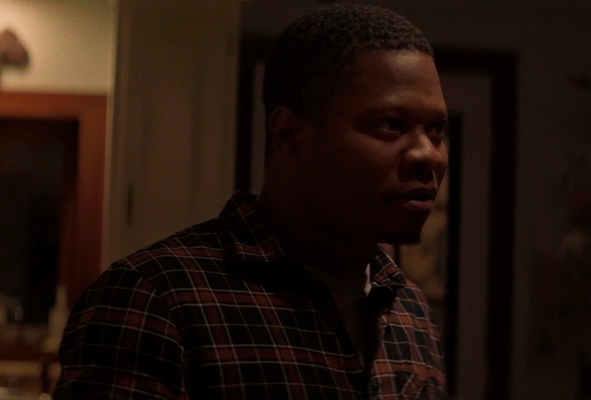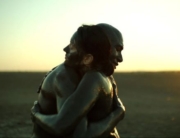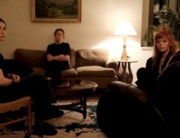Tyrel asks not only what it’s like to be black, but what it is like to be black while partying with a bunch of rambunctious, slightly nerdy, but definitely drunk white dudes. The answer: not great. There’s more, of course. Tyler (the film is named Tyrel because of one white guy mishears Tyler’s name) is invited up to for the weekend by his friend Johnny (Christopher Abbott). Tyler needs to escape some family drama, or more specifically, his girlfriend’s family drama, and is desperate to unwind, so Chris invites him up to his friend Nico’s house for the weekend to celebrate another friend’s birthday.
As soon as they arrive, Tyler realizes he is the only black man there. His guard goes up, and the camera moves in. The boys are gregarious and welcoming. Tyler attempts to return that warmth, but he can’t help but side glance his friend. The rest of the weekend has Tyler maneuvering microaggressions, naiveté, and cultural differences with a grin and a grimace until it becomes too much and he shuts down and decides to cope in, let’s say, a not particularly healthy way.
The plot sounds like the worst of social justice art, but director Sebastián Silva isn’t jonesing for progressive points. His characters aren’t caricatures, and Tyler isn’t portrayed as noble and forthright. Tyler has flaws. He’s obsessed with social media and constantly on his phone. He ran away with the boys instead of facing his family situation, and his coping skills accent his desire to escape.
Chris alternately checks in on him when the rest of the gang get too noisy and chides him for not participating more. He sincerely wants his friend to have a good time. Interestingly, there is an older, gay man in the mix (played by Faith No More keyboardist and Imperial Teen frontman Roddy Bottum), who tends to watch everything from an amused and occasionally irritated remove. Some relief comes to Tyler about halfway through the weekend when the richest and smuggest of the group, Alan (a perfectly smarmy Michael Cera), arrives. Alan is the first to directly acknowledge Tyler’s blackness and that his life experience might be different. The rest of the well-intentioned young men might simply be quoting Stephen Colbert playing, well, Stephen Colbert on The Colbert Report, who famously said, “I don’t see color.”
For the most part, we are in Tyler’s shoes. We feel his paranoia when the boys get rowdy, which includes dancing around to R.E.M. songs and burning famed prints of old religious paintings. When Tyler feels particularly vulnerable, the camera pushes closer to him until there’s nothing left but his face and the ambient sound heightens. Silva wants us to feel how he feels. And Jason Mitchell complies in a simply astounding performance. You sense his need to fit in—to relax and simply enjoy himself—collide with the feeling that, well, danger may be lurking at any given moment. He displays this with an open face and a gregarious smile that changes when his eyes narrow and his shoulders stoop ever so slightly at moments when the guys raise their voice. His later slide toward irresponsible behavior is perfectly understandable as is his need to escape. We watch as the others lose themself to abandon, hooting, and hollering, because they can. Tyler is in a corner observing because here, in this situation, he knows he can’t.
Lest we believe that Tyrel’s issue is simply feeling left out, Silva has Tyrel leave the party, desperate for some quiet, and stumble onto the house of a middle-aged woman who takes him in in a kind and motherly manner. But her husband, who is black, is not so pleased. (And without giving too much away, it isn’t only the fact that Tyler is a young black man.) The film ends the next morning with a reconciliation and an invitation to Tyler to join the guys in a photo. The last shot encapsulates what it feels like to be eternally an outsider. It is as chilling as the end of any horror film.
Silva is working here similarly in the vein of American neo-realist Sean Baker. He even uses The Florida Project’s cinematographer Alexis Zabe to simply create a slice of life. Like Baker’s best films, these characters work in a social environment that forces and defines limits their actions. Silva does this with a delicate subtlety, and we would be wise to pay attention.







Leave A Comment